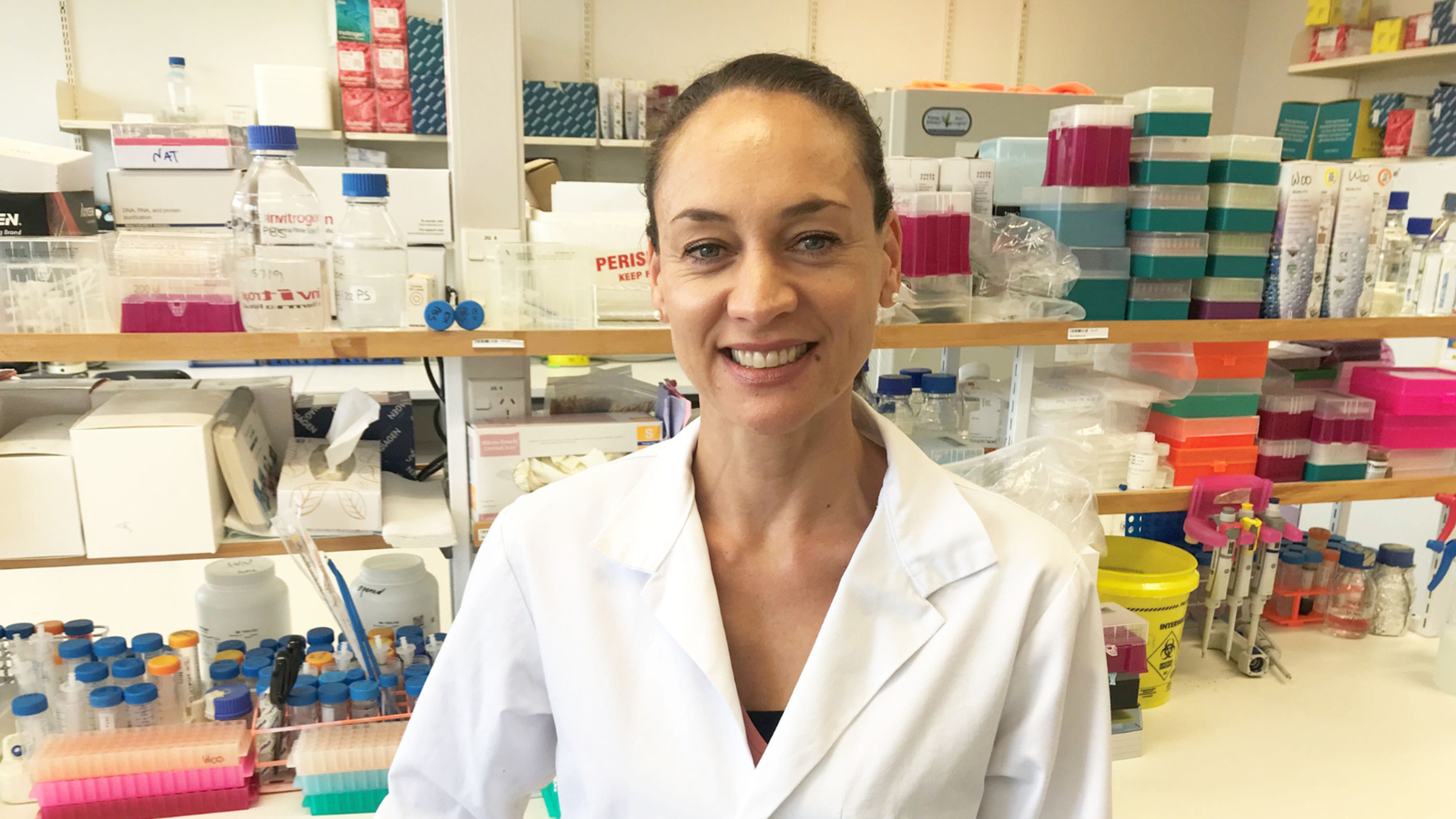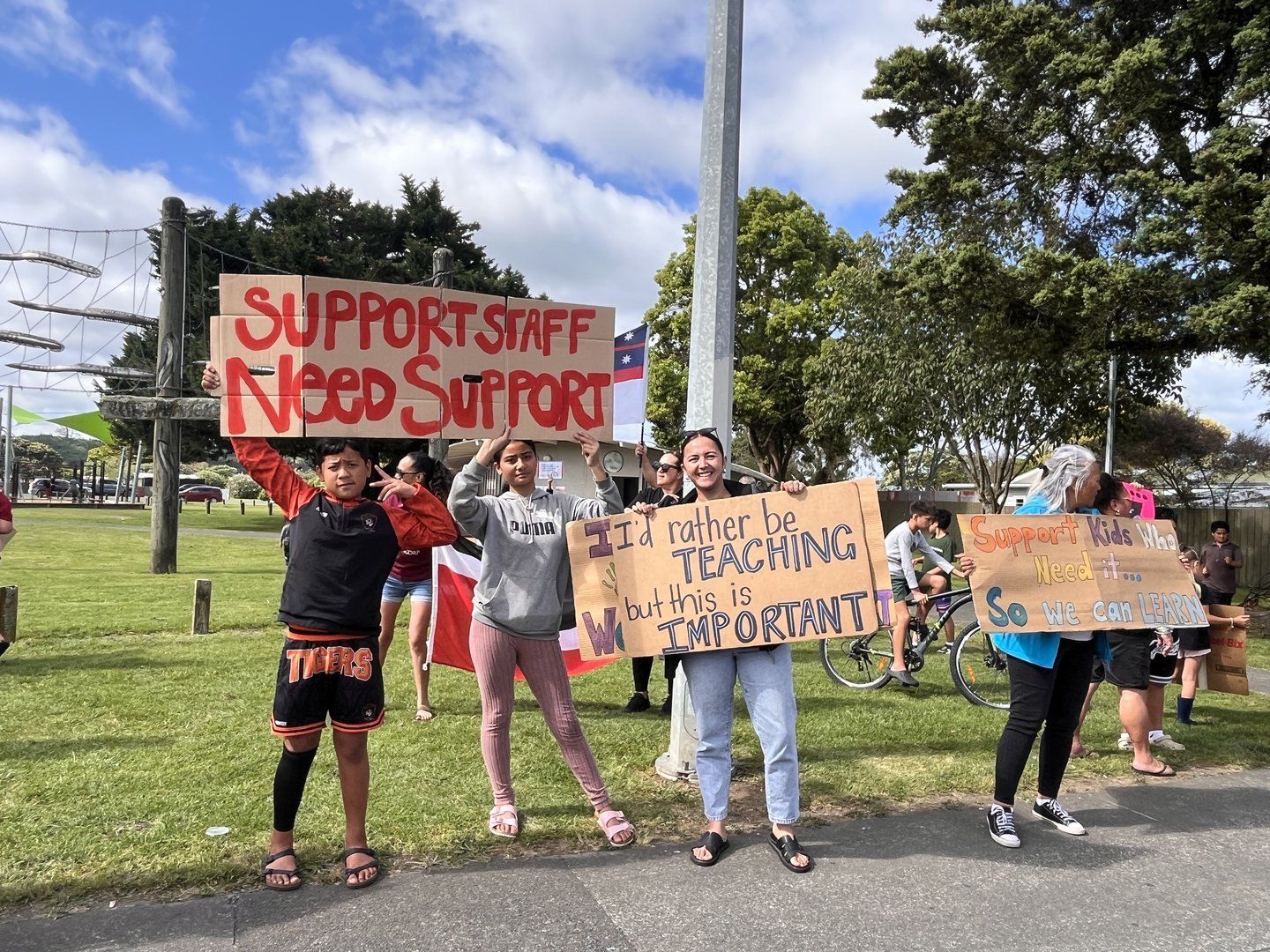

Konini School principal Kahli Oliveira (centre in black jacket holding cardboard sign) with supporters and students.
Photo/RNZ/Calvin Samuel
Pacific teachers call for respect as nationwide strike hits schools
The educators say their roles extend beyond teaching, emotional support, planning, and cultural connections.



‘Shot put queen’ Dame Valerie Adams leads Pacific pride at NZ's Halberg Awards 2026

Pacific digital-finance push continues despite global crypto volatility



Fiji fast-tracks needle programme as new study shows HIV cases surging at record pace

‘Shot put queen’ Dame Valerie Adams leads Pacific pride at NZ's Halberg Awards 2026

Pacific digital-finance push continues despite global crypto volatility

Pacific teachers are calling for greater recognition of the unseen hours and emotional energy they invest in supporting students and their families.
They say that their work goes far beyond the classroom. It includes providing emotional support, planning, and fostering cultural connections.
This comes as a nationwide ‘megastrike’ goes ahead on Thursday, bringing attention to the challenges they face, involving tens of thousands of doctors, nurses, and Accident Compensation Corporation (ACC) workers in one of the largest labour actions in four decades.
Teachers are calling for more recognition of the unseen hours and emotional energy they invest in supporting students and their families.
Speaking with William Terite on Pacific Mornings, Nick* a primary school teacher in South Auckland, says he supports the strike action.
“No one wants to be on strike, but the union feels like this is the best course of action,” he says. “I don't think any teacher wants students to miss school … we're always pushing for things like student attendance, but it's this constant feeling of disrespect that has led to this … the level of respect that our government has for us public service workers is very low.”
Watch Nick's full interview below.
In an open letter over the weekend, Public Service Minister Judith Collins claimed that under the latest pay offer, two-thirds of primary teachers would have a base salary of at least $100,000 within 12 months of ratification.
But Nick says that figure does not apply to him and is concerned the Government’s pay calculations might deter new teachers from entering the profession.
“When I started as a teacher five years ago, my salary was lower than the living wage, based on the amount of hours that I worked. But so many of the people that I went to university with are probably no longer in the profession.”
Kahli Oliveira, principal at Konini School, told Radio New Zealand that teachers are "under-resourced, underpaid, and undervalued".
When she received a new curriculum on Sunday night, she says, "I just realised the government doesn't care about us. They don't care about our kids, they don't care about what we're dealing with on a daily basis, and we need more of everything."
Unseen hours
Nick is attending a course today about changes to the curriculum but says the workload and some comments made by government ministers about teacher compensation during school holidays are out of touch with reality.
“Ninety-nine per cent of teachers love being in the class, we love the job of teaching, it's everything else that is placed upon us that leads to burnout. A lot of us are here from 7.30 to 5pm, making sure that we're catching up those extra things.
“These holidays are used for work, we use that time for planning, and we use that to try and reduce the burnout that we have during the school term.”

Protesters in Moerewa, Northland. Photo/RNZ/Belinda McCammon
Karl Vasau, principal at Rowandale School, explains the depth of work that goes on behind the scenes in classrooms and the high level of student engagement.
Speaking with Tofiga Fepulea’i on Island Time, he says genuine connections between teachers and students and how the educator responds, are crucial.
“We have to be professional performers and read the mood, noticing what children aren’t verbally saying. People don’t see how much time and effort goes into preparation, planning, and building cultural connections. Teachers go above and beyond to make sure every child has a voice and feels valued.”
Teaching matters
Vasau’s comments align with the Teaching Matters campaign, which aims to raise awareness of the challenges facing the teaching profession and the need for better support and pay.
“If you empower us, if you encourage us, if you support us, we will open the world for your kids.”
Watch Karl Vasau's full interview below.
Dagmar Dyck, Assistant Pro Vice Chancellor Pacific at Auckland University of Technology, says teachers are vital in shaping young people’s sense of belonging and identity.
“I spent 10 years in a beautiful primary school in Mount Wellington, Sylvia Park School, where I had the absolute privilege of teaching in front of our beautiful children every day,” she tells John Pulu on PMN Tonga.
“We don't leave our culture at the school gate. We bring it with us. In the Pacific context, it’s not just one learner. It is a learner with their whānau, their aiga and their village behind them, and they come with them into that school journey and we bring them through together.”
Nick says further strike action has not been mentioned at this stage.
"The teachers unions will meet back with the negotiators to discuss terms, and following the next offer they’ll put it out to the members for next steps."
*PMN has agreed not to state the teacher’s last name or their place of work.
Watch Dagmar Dyck's full interview below.